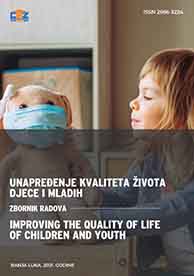UTJECAJ PANDEMIJE COVID-19 NA NAČIN FUNKCIONISANJA PORODICE
THE INFLUENCE OF THE COVID-19 PANDEMIC ON THE FAMILY FUNCTIONING
Author(s): Sanela Pekić, Almina ŠatrovićSubject(s): Social Sciences, Psychology, Sociology
Published by: CENTAR MODERNIH ZNANJA
Keywords: pandemic; family; internet; coronavirus;
Summary/Abstract: Objectives: The Association of Social Workers of Sarajevo Canton conducted a study that sought to determine how the COVID-19 pandemic affected the functioning of the family. Methods: For the purposes of the research, an online survey questionnaire was created that examined: the economic stability of the family, the functioning of the family, the use of the Internet, the loss of family members and loved ones, and ways of dealing with stressful situations. In order to get a more complete picture, a structured interview was conducted. The survey was completed by 386 respondents, and the interview was conducted with 24 respondents. Results: Families adapted quite well to the given conditions, although about 40% of respondents had losses of family members and relatives due to COVID-19, and 43.8% of them stated that they had lower incomes compared to the period before the pandemic. Almost 25% of respondents were dissatisfied with the way they coped with the challenges. Compared to the period before the pandemic, 22.5% of respondents indicated that they used tranquilizers more. Most respondents did not seek help to cope with the new situation, and those who sought help did so online and in private counseling centers. Work from home and online classes have significantly affected the functioning of the family. Slightly more than 50% of respondents did their job online. Conclusions: The pandemic affected the way the family functioned. Although the use of the Internet during a pandemic has contributed to a sense of connection with loved ones and allowed work and teaching to be realized to a certain extent, in order to prevent negative consequences it is necessary to control the time and content used. Respondents do not recognize that they need help in mental health care, and even when they do, they show distrust of the psycho-social protection system and seek help on social networks and in private counseling centers. It is necessary to normalize the search for support from experts and build citizens' trust in existing psycho-social protection services as well as develop new ones.
Journal: DRUŠTVENE DEVIJACIJE
- Issue Year: VI/2021
- Issue No: 6
- Page Range: 295-302
- Page Count: 8
- Language: Bosnian, Croatian, Serbian

